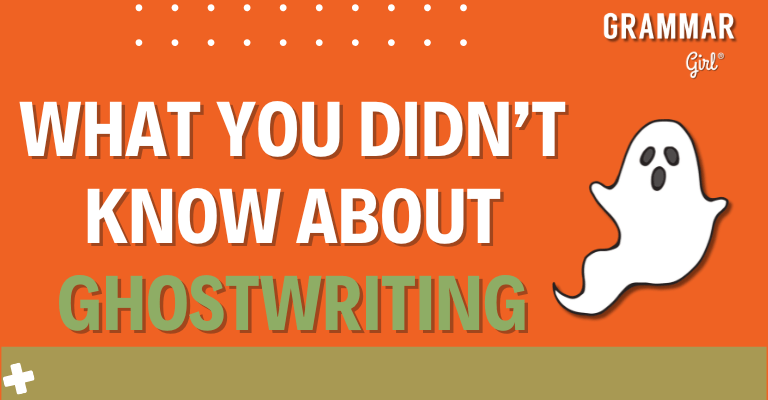Ghostwriting is often associated with celebrity memoirs or business books, but there’s another side to the industry that gets far less attention: fiction ghostwriting.
In this Grammar Girl episode, Mignon Fogarty speaks with Dan Gerstein, founder of Gotham Ghostwriters, about how fiction ghostwriting works, who hires ghostwriters, and how AI is (and isn’t) changing the writing profession. With over 30 years of experience in writing and communications, Dan has great insights on the rapidly changing world of collaborative storytelling.
Ghostwriting fiction is a different kind of collaboration
Although nonfiction ghostwriting tends to be about shaping and refining a client’s vision, fiction ghostwriting is often more intensive and creatively involved.
“For a lot of the people who are hiring ghostwriters to write a novel, they may have an inspiration or an idea, but really what they’re struggling with is how do you construct the narrative, character development—all these things which are really hard to do.”
Dan says authors who seek help with fiction typically fall into two categories: dreamers, who hope to turn their idea into a marketable story (sometimes for screen adaptation), and bucket list writers, who want to finally tell the story they’ve carried for years—even if only friends and family read it.
Royalties, rights, and risk
Ghostwriting deals for fiction can vary significantly depending on the project and the people involved. In some cases, ghostwriters are paid a flat fee. In other cases—especially when the client has a limited budget or the project has high commercial potential—ghostwriters may take a smaller upfront payment in exchange for a share of royalties or film rights.
“Some ghostwriters will say, ‘I will discount the fee I normally charge if I see some sales potential,’ and then negotiate a bigger chunk of the back end.”
There’s no industry standard. Dan notes that experienced ghostwriters with agents tend to fare better in negotiations, especially when derivative rights (like movie deals) are on the table.
The stigma around ghostwritten fiction is fading
Although celebrity fiction often draws public skepticism—think: “Did they really write that?”—Dan believes the backlash stems more from expectations than ethics.
“If the author misleads their audience and says, ‘Yes, I wrote this book on my own,’ then people have grounds to criticize. But otherwise, it’s unfair. Most celebrities aren’t writers—that’s not their job.”
More transparency could help. Just as translators and editors increasingly receive public credit, there’s a growing movement to acknowledge ghostwriters and collaborators by name—not just in passing acknowledgments, but as part of the team that brought the book to life.
What AI means for ghostwriting
As with every creative field, AI is shaking up the writing industry. Dan breaks it down into tiers. Lower-cost content writing—especially for SEO—is being heavily disrupted. Mid-level writers are seeing their roles shift into AI prompting, editing, and project management. But for high-level ghostwriters, the outlook is different.
“People are going to try to use AI to do this kind of work, and they’re going to fail miserably. The greatest value a professional ghostwriter provides happens before a single word is written.”
Dan says that the real magic of ghostwriting is in developing ideas, drawing out personal stories, and building a narrative arc—things AI simply can’t do on its own. In fact, Gotham Ghostwriters now sees some clients come in as “AI refugees”—authors who tried AI tools and realized they needed the human touch after all.
That said, AI could still help ghostwriters increase their productivity.
“Elite writers will be able to do more work because they can outsource some of the time-intensive blocking and tackling to the technology. It will allow them to take on more work and ultimately earn more money.”
Celebrating collaboration
As ghostwriting becomes more accepted and visible, Gotham Ghostwriters is helping lead the shift. They launched the “Andys”—an award for collaborative book projects, judged and credited jointly between the author and ghostwriter.
“We very purposely didn’t want it to be about ghostwriters. We wanted it to be about the partnership.”
Want to hear the full conversation?
To listen to the whole interview on the go, check out the podcast on Apple Podcasts or Spotify.
🎧 In the full episode, Dan and Mignon also look at:
-
How fiction ghostwriters get hired.
-
Why Millie Bobby Brown’s ghostwritten novel sparked controversy.
-
What publishing can learn from other creative industries about transparency.
Also, check out a second interview where Dan gets into more detail about how ghostwriting works for nonfiction and why it’s a growing market.




